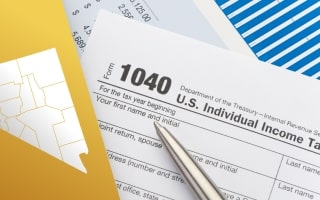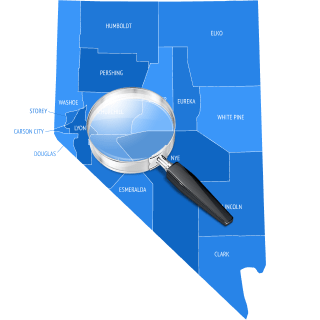Property Tax Records in Nevada

If you buy a home in Nevada, you'll need to pay taxes on the property. Every county in Nevada has a different tax rate. However, the state average is just 0.48%. In comparison, the national average is 0.99%, which means that Nevada property owners don't pay much property tax. For this reason, many invest in Nevada when it comes time to buy a second property or vacation home.
Along with Nevada property tax exemptions and credits, Nevada homeowners also benefit from a low assessment rate. When a county assessor calculates a home's current market value, the assessment value will be measured at a rate of 35%. Property taxes are calculated based on a home's assessment value. In some states, the assessment value is equal to the market value, which usually leads to high property taxes.
Each of the 17 counties in Nevada has a different tax rate. Counties also have the ability to change the tax rate they charge, which is one of the reasons why property taxes increase regularly. However, Nevada property owners are protected from high increases by Nevada's tax abatement law. This law restricts the yearly increase in property tax bills to 3%.
Even though Nevada doesn't levy high property taxes, it has always relied on tax revenues. Before 1901, the entire property tax system was handled by county assessors. However, some county assessors didn't enforce a fair property tax, which is why the State Board of Assessors was founded in 1901 to implement checks and balances.
Property Tax Assessment in Nevada

You'll receive a property tax bill every year that informs you of how much you owe. These bills are typically sent by August 1. You can choose to make these payments in four installments or as part of your mortgage payments. Nevada property taxes are based on a home's market value. While county assessors are tasked with reappraising every property once per five years, they may choose to do so every year.
Your home's taxable value will be calculated based on the land's cash value and the replacement cost for every building on the property. Keep in mind that a depreciation amount of 1.5% is factored into the equation. A home's assessed value is 35% of the taxable value. If your property's taxable value is $200,000, the assessed value will be $70,000. Your county's tax rate will apply to the $70,000.
Nevada tax rates are displayed as dollars per $100 of assessed value. If you live in a county with a $2.50 tax rate, your annual tax bill will be $1,750. You can also perform this calculation by identifying your county's effective tax rate, which might be something like 0.50%. Apply this rate to your home's full taxable value. The tax rates in the most populous Nevada counties are:
- Clark County: 0.56%
- Washoe County: 0.59%
- Lyon County: 0.96%
- Carson City: 0.70%
- Nye County: 0.84%
Clark County property taxes are lower than Lyon County and many other counties in Nevada. This is an anomaly as highly-populated counties normally have higher property taxes than less-populated counties.
Calculate Nevada Taxes
using our property tax calculator.
Nevada Property Tax Records: What Are They?

In Nevada, the taxes that are collected by the state are used to pay for local services, which include police, schools, parks, and roads. Each county uses these revenues to cover some of the costs in its annual budget. For example, Lyon County uses a portion of these funds to pay for the expenditures of various local governments, which include school districts. Some of the money also goes into Nevada's bond debt redemption.
If you're interested in purchasing a home but want to know more about it, consider accessing property tax records. These records are available to the public for free. When you want to access these documents, you can find them on the county government's website. When you submit the home address or parcel ID, you'll receive a lot of information about the property. The types of details you'll gain access to property owner name and also the following:
-
Parcel number
-
Property address
-
City and assessor description
-
Tax district and appraisal year
-
Assessed value and taxable value
-
Estimated lot size
-
Previous sale price
-
Info about the primary residential structure
-
Assessor map
-
Aerial view
-
Building sketch
-
Ownership history
Property Tax Exemptions and Deductions in Nevada

Homeowners in Nevada have access to several property tax deductions, the primary of which is a type of homestead exemption that applies to people with disabilities and veterans. If you qualify for a property tax exemption, it will reduce your home's assessed value by a certain amount.
Veteran's Exemption: This exemption is available to homeowners who have served in any branch of the U.S. Military. The service must have taken place for at least 90 continuous days during specific periods. For example, homeowners who served in the military between June 25, 1950, and May 7, 1975, may qualify for this exemption. If you qualify for the exemption, your home's assessed value will be reduced by $3,440.
Surviving Spouse Exemption: If you're a surviving spouse of a veteran, you may qualify for this exemption. You'll need to provide a copy of your driver's license as well as your spouse's death certificate. The exemption amount ranges from $1,720 to $6,880.
Disabled Veteran's Exemption: The Disabled Veteran's Exemption is available to veterans who obtained a service-connected disability that has a rating of 60% or higher. Your exemption amount depends on the degree of your disability. Make sure you provide documentation that proves your disability rating, which can come from the Armed Forces of the United States or the Veteran's Administration.
If you have a disability rating that measures 60%-79%, you'll receive an exemption of $17,200. Your exemption will increase to $25,800 of your home's assessed value if you have a disability rating of 80%-99%. A disability rating of 100% grants you access to an exemption of $34,400.
Blind Exemption: You might qualify for this exemption if your visual acuity while wearing corrective lenses doesn't exceed 20/200. The same is true if your sight is restricted to an angle that's less than 20 degrees. The total exemption amount is $5,160 or $8,600 if you're blind and a veteran.
How To Search Property Tax Records in Nevada

If you want to buy a home or a rental property in Nevada, there are a couple of methods you can use to search for property tax records. Every county in the state offers a property tax portal that provides the latest tax information as well as many additional details about real estate. Here is some information on how to search property tax records in Nevada.
The Clark County tax records website allows the public to search for these documents with such parameters as:
-
Parcel map inquiry
-
Subdivision owners
-
Parcel number tree
-
Subdivision name
-
Parcel type and page
-
Owner name
-
Address
-
Parcel number
You can also use third-party software to find the latest tax records. While there are many tools available to you, consider PropertyChecker. This website allows you to access property tax records in Nevada by entering data like the property address, the owner's phone number, or the parcel ID. You'll then be able to view comprehensive property details, which include the following:
-
Purchase history
-
Deeds
-
Property tax records
-
Current property owners
-
Property Values
-
Details about the home
-
Loan records
-
Lien records
-
Foreclosures
-
Neighborhood info
-
Building permit details
How To Appeal Property Taxes in Nevada

Once you buy a home in Nevada, you'll begin to receive property tax bills as well as assessment notices. A Notice of Assessment is a type of document that lists your home's assessed value and taxable value. Keep in mind that the assessed value is 35% of the taxable value. You should receive your Notice of Assessment by December 18. This value is what your next tax bill will be based on.
Assessment values aren't always accurate. If the county assessor has made an error or believes that the value of your home is much higher than it should be, you can appeal the assessment value. This process begins by asking for an explanation of your home's value. Here is the step-by-step guide on how to appeal property taxes in Nevada.
Step 1: Once you have your Notice of Assessment, you can request a detailed explanation of the tax assessment. You can contact the county's revenue officer or auditor to receive this info. Clarification about this information is available by asking to speak with the supervisor.
Step 2: If you still don't believe that the assessment value is correct, fill out and submit the Universal Petition for Redetermination Form. You'll have 45 days to submit this form, which should be stated on your Notice of Assessment. If you don't file the petition by this date, the assessment value will become final.
Step 3: The Petition Supervisor in your county will then review the appeal that you've submitted. If you obtained a second opinion from another assessor, this information should be presented alongside your appeal. There's a possibility that the matter will be sent back to the original assessor.
Step 4: If you still don't agree with the assessment and don't have any additional documentation to submit, you'll be able to take part in an evidentiary hearing in front of an Administrative Law Judge. These hearings can be held in Carson City, Elko, Reno, or Las Vegas.
Step 5: Once the Administrative Law Judge hears the case, they will make a decision. You should receive the decision immediately.
Step 6: There's an additional step you can pursue if your initial appeal isn't successful. The judge's decision can be appealed directly to the Nevada Tax Commission. Make sure you submit the Notice of Appeal form within 30 days after the initial decision is made. If the Tax Commission decides to hear your case, the hearing can take place in Carson City, Las Vegas, or Reno. You may want to request legal assistance for this stage of the appeals process.
How Property Tax Records Impact Real Estate Transactions in Nevada

Property taxes in Nevada are low enough to not be a significant factor in many real estate transactions. However, buyers, sellers, and investors should understand what role these taxes play in a typical real estate transaction. Homeowners often choose to pay their taxes with their mortgage payments. If you have a tax bill of $1,800 for the year, your monthly mortgage payment will increase by $150. It's highly recommended that you consider property taxes when estimating how much you can afford.
If you're investing in a Nevada home or rental property, estimate how property taxes will impact your tax flow. For investors, obtaining a positive cash flow is the only way to earn a profit on a real estate investment. If an investor gets a high property tax bill for the year, they may need to increase rent or reduce other expenses to compensate.
All Nevada counties host property tax sales, which investors can bid on. These sales occur for properties that are considered delinquent, which means that the taxes have gone unpaid for several years.
Homeowners in Nevada have a 10-day grace period after taxes are due to make their payments. If they don't, a 4% penalty is added. When two installments haven't been paid, a 5% penalty will be added. Penalties will continue to accrue with each missed installment.
If you don't pay your property taxes by the fourth installment due date, the county treasurer will be able to hold your home for two years. During this period, you can repay your delinquent taxes and take full ownership of your home. If you don't make these payments on time, the county treasurer will receive a deed to the property and sell it via a tax sale. Tax sales are public auctions that investors commonly take part in. Tax sales in Nevada are a great way to pick up solid deals on real estate.
Free Nevada Property Tax Lookup
Tax Records Please wait...
Property Tax Guide
- Property Tax Records in Nevada
- Property Tax Assessment in Nevada
- Nevada Property Tax Records: What Are They?
- Property Tax Exemptions and Deductions in Nevada
- How To Search Property Tax Records in Nevada
- How To Appeal Property Taxes in Nevada
- How Property Tax Records Impact Real Estate Transactions in Nevada
Instant Access to Nevada Property Records
- Owner(s)
- Deed Records
- Loans & Liens
- Values
- Taxes
- Building Permits
- Purchase History
- Property Details
- And More!
Free Nevada Property Tax Lookup
Tax Records Please wait...
Property Tax Guide
- Property Tax Records in Nevada
- Property Tax Assessment in Nevada
- Nevada Property Tax Records: What Are They?
- Property Tax Exemptions and Deductions in Nevada
- How To Search Property Tax Records in Nevada
- How To Appeal Property Taxes in Nevada
- How Property Tax Records Impact Real Estate Transactions in Nevada